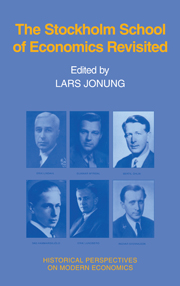Book contents
- Frontmatter
- Dedication
- Contents
- Preface
- List of Contributors
- Dramatis Personae at the end of 1937
- Introduction and Summary
- Part I The roots
- 1 The Political Economy Club and the Stockholm School, 1917–1951
- 2 Gösta Bagge, the Rockefeller Foundation, and empirical social science research in Sweden, 1924–1940
- 3 The Committee on Unemployment and the Stockholm School
- Comment
- Comment
- Part II The approach of the Stockholm School
- Part III The impact of the Stockholm School
- Part IV What remains of the Stockholm School?
- The Stockholm School: A non-Swedish bibliography
Comment
Published online by Cambridge University Press: 05 July 2013
- Frontmatter
- Dedication
- Contents
- Preface
- List of Contributors
- Dramatis Personae at the end of 1937
- Introduction and Summary
- Part I The roots
- 1 The Political Economy Club and the Stockholm School, 1917–1951
- 2 Gösta Bagge, the Rockefeller Foundation, and empirical social science research in Sweden, 1924–1940
- 3 The Committee on Unemployment and the Stockholm School
- Comment
- Comment
- Part II The approach of the Stockholm School
- Part III The impact of the Stockholm School
- Part IV What remains of the Stockholm School?
- The Stockholm School: A non-Swedish bibliography
Summary
Wadensjö's paper is an important contribution to our understanding of how the notions of the Stockholm School arose with special regard to the interplay between economic theory and politics. His findings seem to reinforce the conclusions previously reached by Karl-Gustav Landgren in his book on the rise of the new economics in Sweden from 1927 to 1939 published in 1960, namely, that the chief architect of the new economic policy and, in fact, the most consistent advocate of the new theoretical insights was Ernst Wigforss; and that the only academic economist who at an early stage succeeded in liberating himself from the preconceptions of the old theory was Bertil Ohlin. Ohlin was actually the only member of the Stockholm economists who came close to a theory of output as a whole. One point of considerable interest in Wadensjö's paper is his discovery that Ohlin, under pressure from Hammarskjöld and others, published a somewhat emasculated version of his theory in his supplement to the report from the Committee on Unemployment. Wadensjö's concluding reflections on the considerable dependence of the Stockholm economists upon governmental assignment (e.g., the Committee on Unemployment) for developing their theoretical work raises interesting questions that are worthy of further consideration.
- Type
- Chapter
- Information
- The Stockholm School of Economics Revisited , pp. 124 - 128Publisher: Cambridge University PressPrint publication year: 1991

